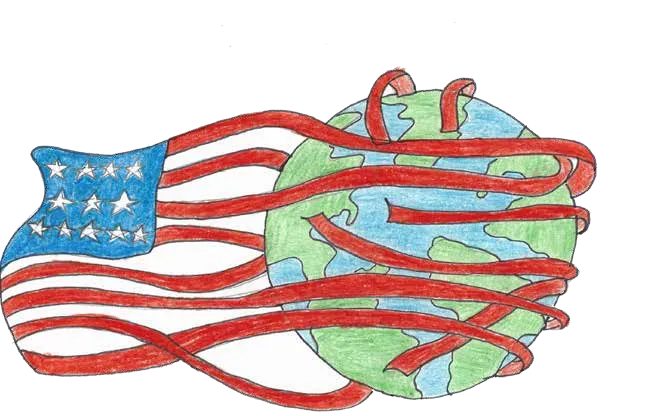
America Inc's Global Dominance
Albert Griffiths, LVI, tackles the increasing risks of our reliance on America for arms, and why it affects us.
Albert Griffiths
LVI

Artwork by Lorenza Rees
Deputy & History Editor, 2025
In March 2025, the 35th plane in an order of model 48 F-35Bs arrived on UK shores, as part of a £9.1 billion contract between the UK government and Lockheed Martin, an American defence and aerospace manufacturer. In the same month, military aid to Ukraine was paused indefinitely following heated diplomatic discussions between the two nations. I will explain how these two separate statements are entirely interlinked, how they help to explain the extent of which American influence stretches across the globe, and how changing tides in Washington will impact all of us.
The North Atlantic Treaty Organisation is a military alliance, formed in 1949 to ‘protect its member’s freedom and security. It is through this organisation that US defence firms export military equipment to member states across the continent, with NATO states accounting for a 35% share of US arms exports. In contrast, 65% of NATO arms imports over the past 4 years were from the USA, hinting at an unhealthy dependency in this trade relationship. The States does not limit its arms exports to Europe, however - its 4 largest customers are all middle eastern countries - Saudi Arabia, Qatar, Kuwait and Israel. European nations, traditionally adopting a more relaxed policy of reliance on their all-powerful NATO partner, have begun to change their perspective in relation to defence funding. These decisions have followed the Trump administration’s shift in tone regarding defence funding for Ukraine, with Starmer convening a ‘coalition of the willing’ in an attempt to re-frame Europe’s approach to defence and increase funding for the defence of their eastern flank.
In truth, many believe that our military dependence on the USA creates more problems than solutions. As demonstrated by the new trump administration, our relationship with the US is not as concrete as some may think, and a unified Europe may be required to protect Ukraine from Russian expansion. However, despite President Trump’s divisive rhetoric concerning NATO relations, America’s influence has never been stronger, with 40 US-operated military bases stationed across central Europe. European nations are also acting quickly to bolster military investment, with a proposed 800 billion euros to be put aside for military funding. European leaders are beginning to decide that an operational military that is supplied at the whim of volatile US leaders, who can ‘turn off the tap’ whenever they see fit (as we have seen in Ukraine), and do not seem to share the same concern for the threat of Russian aggression, is not beneficial to military security. This brings up the dangerous question of what a US reaction to further Russian expansion could be, which no leader wants to have to ask.
The US is a dominant force in global geopolitics, and nations across Europe can rest knowing that they operate under US security guarantees. However, changing tides in NATO relations, compounded by the conflict in Ukraine, have forced us all to reconsider our reliance on defence guarantees that have dated back to the Second World War.